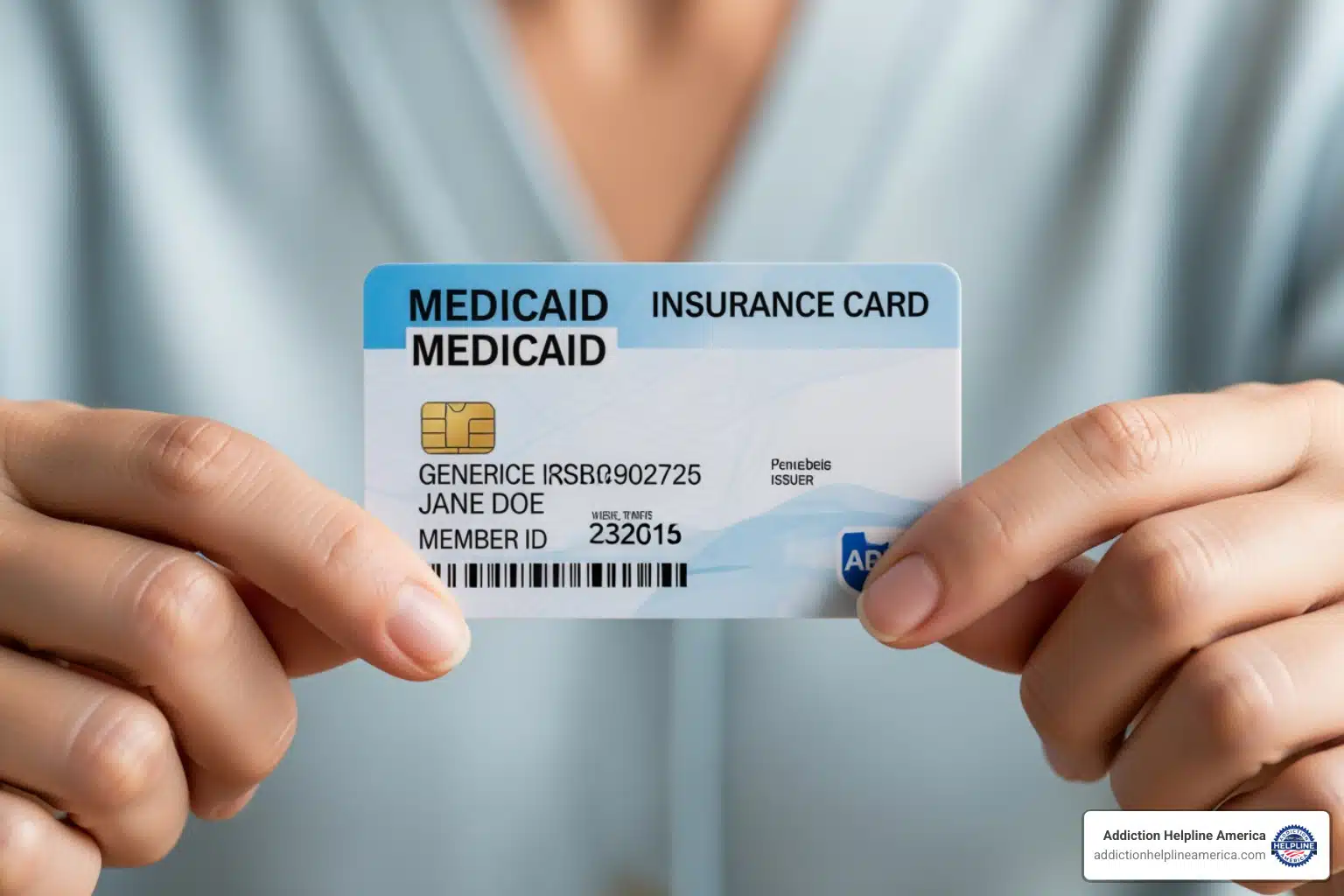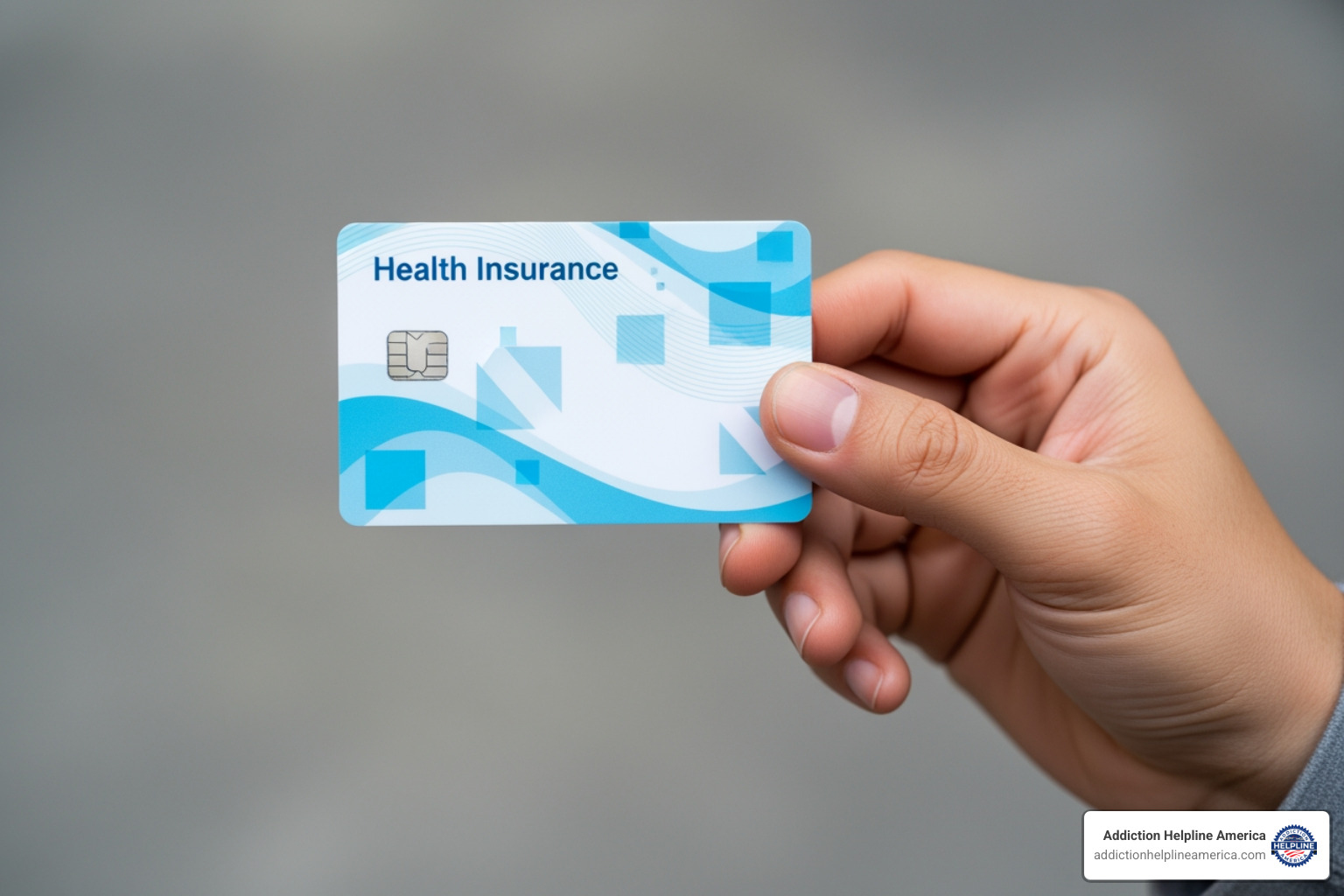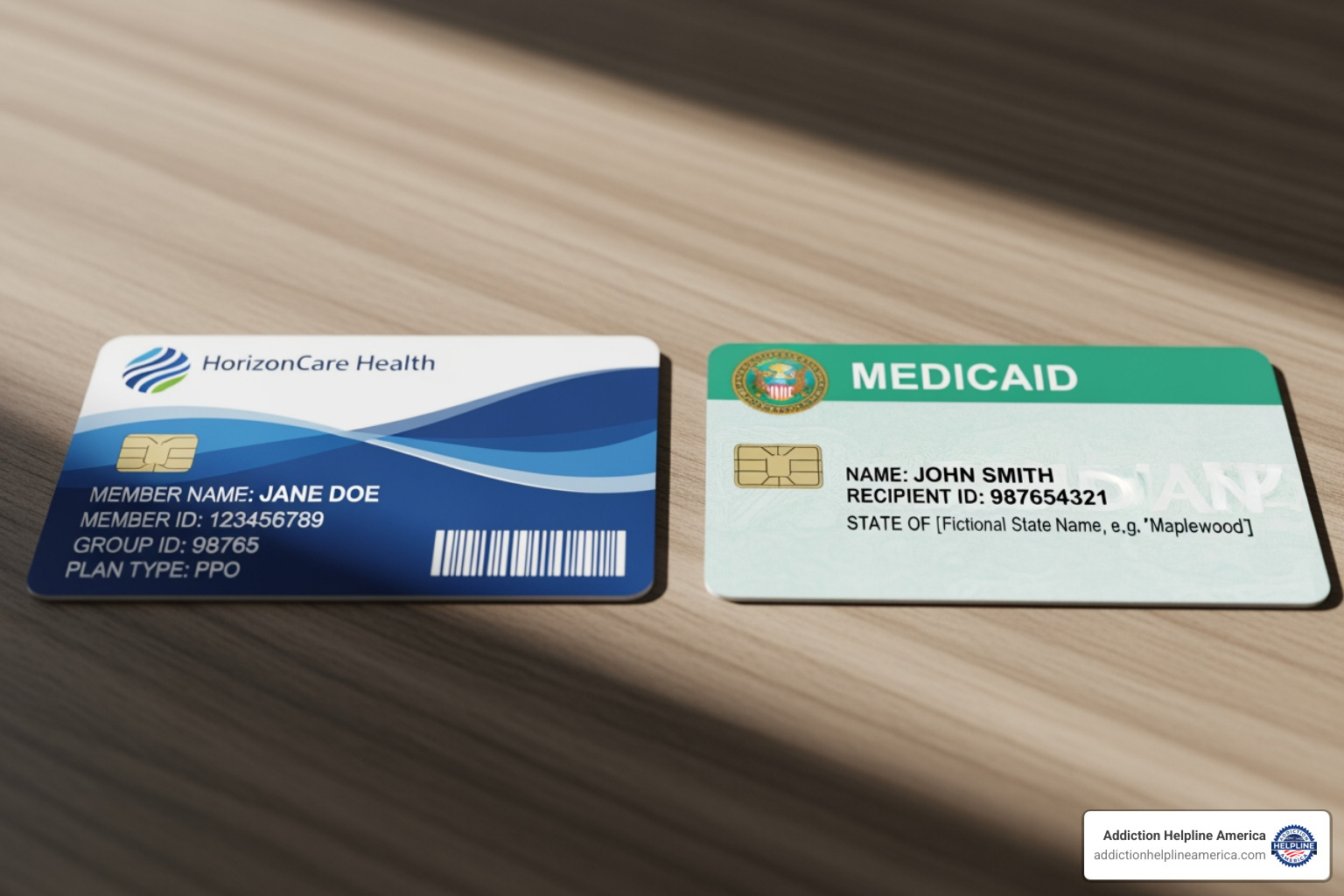
Why Understanding What Drug Rehab Centers Accept Medicaid Matters
What drug rehab centers accept medicaid is a critical question for millions of Americans seeking addiction treatment. The good news is that most drug and alcohol rehab centers do accept Medicaid. According to 2020 data, 71% of treatment facilities nationwide accept Medicaid, making it the largest payer for behavioral health services in the United States. This coverage typically includes medical detox, inpatient and outpatient programs, and medication-assisted treatment (MAT).
Quick Answer: Finding Medicaid-Accepting Rehabs
- Verify your Medicaid eligibility in your state.
- Contact facilities directly to confirm they accept your specific Medicaid plan.
- Use state resources like the Washington Recovery Help Line: 1-866-789-1511.
- Get help navigating options through addiction helplines that can verify benefits.
With over 71 million Americans enrolled in Medicaid and nearly 12% of adult recipients struggling with a substance use disorder, understanding coverage isn’t just a financial question—it’s a matter of life and death. The challenge lies in navigating a complex system of eligibility rules, managed care plans, and prior authorizations that vary by state.
At Addiction Helpline America, we help individuals and families steer the path to recovery. Our team connects you with treatment options that fit your insurance coverage, so cost doesn’t stand between you and healing.
Quick what drug rehab centers accept medicaid definitions:
Understanding Medicaid for Addiction Treatment
Medicaid is a joint federal and state program providing health coverage to millions of Americans, including low-income individuals, children, pregnant individuals, seniors, and people with disabilities. Each state runs its own version—like Apple Health in Washington State—but the goal is always to make healthcare accessible.
The Affordable Care Act (ACA) allowed states to expand Medicaid to more low-income adults, which was a game-changer for behavioral health. Medicaid is now the single largest payer for mental health services in the U.S., playing a vital role in covering treatment for substance use disorders.
Addiction Helpline America connects individuals to treatment resources in all 50 states and the District of Columbia. We’ll use Washington’s Apple Health as an example, but the core concepts of eligibility, application, and covered services are similar nationwide. For more state-specific information, see our page on Washington rehabs or visit the official Medicaid.gov eligibility page.
Eligibility Requirements for Washington’s Apple Health
Eligibility for Medicaid typically depends on your income, household size, age, disability status, and whether you are pregnant. In states that expanded Medicaid, like Washington, adults often qualify if their income is up to 138% of the Federal Poverty Level (FPL).
For example, Washington’s monthly income limits for adults (ages 19-65) are based on household size:
- 1 person: ~$1,677/month
- 2 people: ~$2,268/month
- 3 people: ~$2,859/month
- 4 people: ~$3,450/month
Different “coverage categories” exist for children, pregnant individuals, adults, and those with disabilities or over age 65. Since limits change, always check the latest information for your state. Washington residents can visit the Washington Health Care Authority (HCA) website.
How to Apply for Medicaid in Washington
Applying for Medicaid is designed to be straightforward. In Washington, you can apply for Apple Health:
- Online: The fastest method is through Washington Healthplanfinder, the state’s health insurance marketplace.
- By Phone: Call Washington Healthplanfinder customer support at 1-855-923-4633.
- By Mail or In Person: Download a paper application or visit a local Community Services Office for assistance.
Be prepared to provide proof of income, address, identity, Social Security numbers, and citizenship or legal immigration status. Approval can take 45-90 days, but coverage is often effective from the date you apply and may even retroactively cover bills from up to three months prior.
Addiction Treatment Services Covered by Medicaid
Yes, Medicaid is required to cover essential health benefits, including services for mental health and substance use disorders. This is thanks to federal parity laws that ensure addiction treatment is covered like any other medical condition.
In Washington, Apple Health covers a wide range of evidence-based services, often without needing a referral. Your individual treatment plan may include:
- Assessments and Diagnosis: The first step to determine the level of care needed.
- Medical Detoxification (Detox): Medically supervised withdrawal management.
- Inpatient Treatment (Residential Rehab): 24/7 care in a residential facility for short-term or long-term stays.
- Outpatient Programs (OP/IOP): Flexible treatment that allows you to live at home. Intensive Outpatient Programs (IOP) offer a more structured schedule.
- Partial Hospitalization Programs (PHP): Day treatment with a high level of care.
- Medication-Assisted Treatment (MAT): Combines FDA-approved medications with counseling. It is a core component of modern addiction care. Learn more about What is Medication Assisted Treatment.
- Counseling and Therapy: Individual, group, and family therapy using methods like CBT and DBT.
- Dual Diagnosis Treatment: Integrated care for co-occurring substance use and mental health disorders.
While exact coverage can vary by state and plan, all essential, evidence-based medical treatments are covered.
How to Find Drug Rehab Centers That Accept Medicaid
Once you understand your Medicaid benefits, the next step is finding the right rehab center. This process can feel like a puzzle, but with the right resources, you can find a place where healing can begin.
Using State and Local Resources
Many resources exist to help you find what drug rehab centers accept medicaid. In Washington State, the Washington Recovery Help Line (1-866-789-1511) is a 24-hour service offering referrals to treatment services that accept Apple Health. You can also visit their website at Washington Recovery Help Line.
County behavioral health agencies are another excellent local resource for lists of approved providers. Of course, that’s where we come in. At Addiction Helpline America, we are a trusted, nationwide resource offering free, confidential guidance. We can help you explore options, verify your benefits, and connect you with centers that accept your specific Medicaid plan. When you’re ready, please Contact Addiction Helpline America for help.
Verifying Coverage with a Rehab Center
Finding a list of centers is a great start, but you must confirm that a facility accepts your specific Medicaid plan. Medicaid often works through managed care organizations (MCOs), which are private insurance companies contracted by the state.
The most reliable method is to call the admissions department of the rehab center. Have your Medicaid ID number ready and ask directly if they accept your specific managed care plan (e.g., “Do you accept Molina Healthcare Apple Health?”).
While on the phone, confirm that your plan covers the services you need, such as inpatient detox or MAT. Ask about prior authorization, which most reputable centers will handle for you. It’s also wise to inquire about waitlists, as Medicaid-funded programs can sometimes have them. Our team at Addiction Helpline America can help you steer this verification process, offering Professional Addiction Help at every step.
What to Ask When You Call Drug Rehab Centers That Accept Medicaid
Once you’ve confirmed a center accepts your plan, ask questions to find the right fit for your recovery goals.
- What specific services and therapies do you offer? Ask about therapies like CBT or DBT, medical services like MAT, and any holistic approaches.
- What is the typical program length? This helps set expectations, though Medicaid covers treatment based on medical necessity.
- Do you have specialized tracks or programs? Some centers excel at treating specific groups (e.g., women, veterans) or co-occurring disorders. For example, some Washington centers offer culturally-specific care for Native Americans or ASL-fluent counselors.
- What are your family involvement policies? Ask about family therapy, visitation, and educational programs. Our guide on Family Involvement in Rehab offers more insight.
- How do you handle aftercare planning? Inquire about relapse prevention, sober living options, and alumni programs.
- What are the credentials of your staff? Look for accreditations from bodies like CARF or The Joint Commission, which indicate a commitment to quality.
- Are there any out-of-pocket costs? Clarify if any small copayments apply to your plan.
Medicaid vs. Private Insurance for Rehab
When searching for treatment, understanding how Medicaid compares to private insurance can help you make informed decisions about your care. Both are paths to recovery, but they work differently.
| Feature | Medicaid | Private Insurance |
|---|---|---|
| Typical Costs | Very low to no premiums, deductibles, or copayments | Varies greatly; premiums, deductibles, copays, coinsurance |
| Network Size | Varies by state and managed care plan; may be limited | Often broader, but can vary by plan (HMO, PPO, EPO) |
| Eligibility | Income-based, often tied to Federal Poverty Level | Employer-sponsored, purchased directly, or through marketplace |
| Covered Services | Comprehensive, mandated by ACA for SUD/MH services | Comprehensive, mandated by ACA for SUD/MH services |
Key Differences in Cost and Coverage
The most significant difference between Medicaid and private insurance is cost. Medicaid was designed for affordability, meaning out-of-pocket costs are typically minimal or non-existent. You can expect little to no monthly premiums, deductibles, or copayments for treatment.
Private insurance plans usually involve monthly premiums, deductibles, and copayments or coinsurance, with costs varying widely by plan.
Fortunately, thanks to the Affordable Care Act (ACA) and the Mental Health Parity and Addiction Equity Act (MHPAEA), both Medicaid and private insurance must provide comprehensive coverage for substance use disorder and mental health treatment. This includes detox, inpatient/outpatient care, and MAT.
Medicaid networks can be more localized, while private insurance (especially PPO plans) may offer a wider choice of providers. It’s also important to know that Medicaid is the “payer of last resort.” If you have other insurance, that plan pays first, and Medicaid covers remaining eligible costs. For a deeper look at the financial side of treatment, see our guide on Addiction Recovery Cost.
What Should I Know About Out-of-Pocket Costs at Drug Rehab Centers That Accept Medicaid?
For most people using Medicaid for addiction treatment, the cost is very little to nothing. Assessments, detox, inpatient and outpatient care, and MAT are generally covered with minimal or no copayments, removing a major barrier to getting help.
In some states or under certain plans, small copayments might apply for prescriptions or specific services, but this is rare for core addiction treatment. Some states also have “share of cost” programs for those whose income is slightly above the normal limit, where you pay a set amount each month before Medicaid covers the rest.
A key benefit of Medicaid is no surprise bills. As long as the facility accepts your plan and the services are deemed medically necessary, you won’t face unexpected costs. Medicaid exists to ensure financial hardship doesn’t prevent access to care. Learn more about these options on our Free Addiction Treatment page.
Advantages of Centers Accepting Both Insurance Types
Some facilities accept both Medicaid and private insurance, which offers significant advantages.
- Continuity of Care: If your insurance status changes (e.g., you get a new job with private insurance), you can continue treatment with the same team without interruption.
- More Service Options: Centers with diverse funding may offer a broader range of specialized programs, therapies, or amenities.
- Flexibility and Peace of Mind: This flexibility removes the stress of finding a new provider if your life circumstances change, allowing you to focus on recovery.
Some of these facilities may offer a higher level of comfort, similar to what’s found in Luxury Rehab Programs. Always discuss your specific insurance situation with any treatment center you consider.
Frequently Asked Questions about Medicaid for Rehab
We understand you have questions about using Medicaid for addiction treatment. Here are answers to some of the most common inquiries.
Are There Rehabs That Specialize in Treating Conditions Common Among Medicaid Recipients?
Yes, many rehab centers that accept Medicaid offer specialized care custom to specific needs, making treatment more effective.
- Dual Diagnosis Treatment: It’s common for addiction to co-occur with mental health conditions like depression or anxiety. Medicaid covers integrated treatment for these co-occurring disorders. Finding a qualified Therapist for Depression and Anxiety can be a great first step.
- Trauma-Informed Care: Many individuals with addiction have a history of trauma. These programs use specific therapies to heal underlying emotional wounds that can fuel substance use.
- Services for Pregnant Individuals: Medicaid prioritizes care for pregnant individuals with substance use disorders. Many centers combine prenatal care with addiction treatment to ensure the health of both mother and baby.
- Culturally Competent Care: Some centers integrate cultural values and traditions into their treatment models, such as programs designed for Native American communities.
- Programs for Families and Adolescents: Medicaid also covers services for youth and often includes family therapy, recognizing that recovery is a family journey.
These specialized programs ensure your treatment is not just accessible but also designed for your unique situation.
How Long Will Medicaid Cover My Stay in Rehab?
Medicaid coverage duration is not based on a fixed number of days but on “medical necessity.” This means your coverage lasts as long as clinical professionals determine you need it to get well.
Your treatment team will create a unique plan based on your progress, the severity of the addiction, and other health factors. They will regularly review your condition and recommend the appropriate length of stay or level of care. Medicaid is generally more flexible than private insurance, supporting a continuum of care from detox and inpatient treatment to long-term outpatient support.
The goal is to provide you with the necessary support for as long as it takes to achieve stable, long-term recovery. For a general overview of treatment lengths, see our Rehab Duration Complete Guide.
Can I Go to a Rehab Center in a Different State with My Medicaid Plan?
Generally, the answer is no. You typically cannot use your Medicaid plan for rehab in a different state.
Medicaid is state-specific. Your Washington Apple Health plan, for example, is designed for Washington residents and in-state providers. Each state runs its own program with its own network.
There is a narrow exception for life-threatening medical emergencies that occur while traveling, but this does not apply to planned addiction treatment. To receive treatment in another state, you would need to establish residency there and apply for that state’s Medicaid program, which can be a complex process.
Therefore, when searching for what drug rehab centers accept medicaid, it is essential to focus on facilities within your state of residence.
Conclusion: Your Path to Recovery is Possible
We’ve covered how to steer finding what drug rehab centers accept medicaid. The most important takeaway is that recovery is within reach, and cost should not be a barrier.
Medicaid, known as Apple Health in Washington and by other names nationwide, is a powerful resource. It is designed to remove the financial obstacles to life-saving addiction treatment, covering a full continuum of care from detox and inpatient rehab to outpatient programs and Medication-Assisted Treatment (MAT).
You now have the knowledge to check your eligibility, apply for coverage, and find a treatment center that fits your needs. This power can help you confidently take the first step toward a healthier future.
You are not alone. At Addiction Helpline America, we believe everyone deserves a chance to heal. Our team offers free, confidential, and personalized guidance to connect you with the right recovery program. We’re here to help you make sense of your options and find a center that accepts your insurance.
Don’t let yesterday’s struggles define your tomorrow. Take that brave first step today.
Our helpline is 100%
free & confidential
If you or someone you care about is struggling with drug or alcohol addiction, we can help you explore your recovery options. Don’t face this challenge alone—seek support from us.
Programs
Resources
Will my insurance
cover addiction
treatment?
We're ready to help
Find the best
drug or alcohol treatment
center
Are you or a loved one struggling with addiction? Call today to speak to a treatment expert.
















